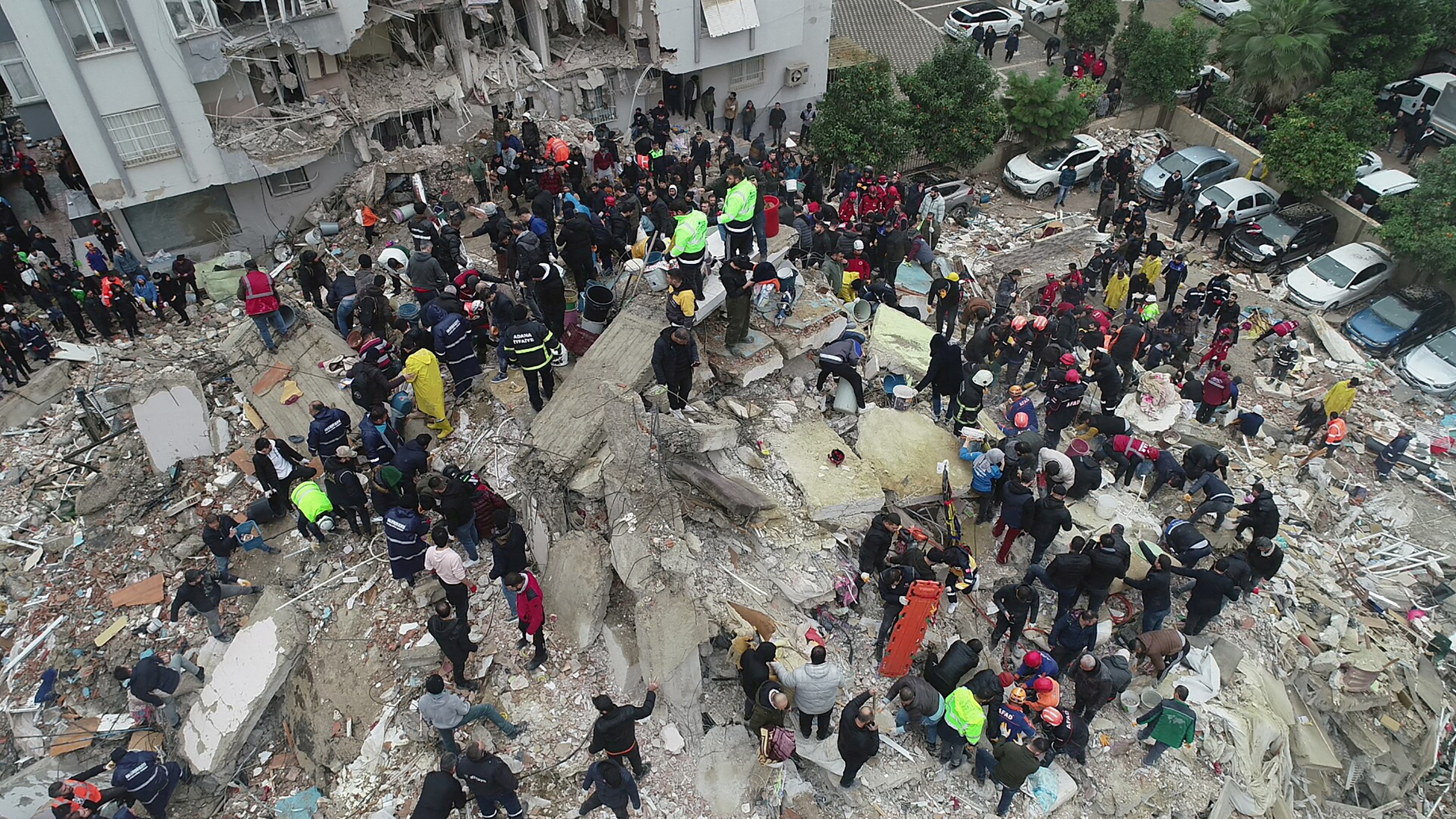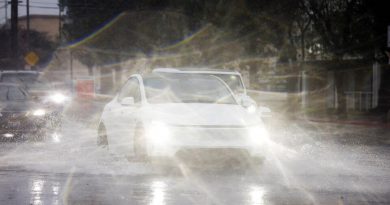Huge earthquake hits Turkey and Syria, kills about 1,700, many trapped
Adana (Reuters) – A huge earthquake killed about 1,700 people and injured thousands more on Monday in central Turkey and northwest Syria, flattening apartment blocks and heaping more destruction on Syrian cities already devastated by years of war.
The magnitude 7.8 quake, which hit before sunrise in bitter winter weather, was the worst to strike Turkey this century. It was followed in the early afternoon by another large quake of magnitude 7.7.
It was not immediately clear how much damage had been done by the second quake, which like the first was felt across the region and endangered rescuers struggling to pull casualties from the rubble, often using their bare hands to remove masonry.
“We were shaken like a cradle. There were nine of us at home. Two sons of mine are still in the rubble, I’m waiting for them,” said a woman with a broken arm and injuries to her face, speaking in an ambulance near the wreckage of a seven-storey block where she had lived in Diyarbakir in southeast Turkey.
In Turkey, the death toll stood at 1,014 people, the head of its disaster agency said.
President Tayyip Erdogan said 5,383 had been injured but he could not predict how much the death toll would rise as search and rescue efforts continued. He added that 2,818 buildings had collapsed.
“Everyone is putting their heart and soul into efforts although winter season, cold weather and the earthquake happening during the night makes things more difficult,” he said.
Live footage from Turkish state broadcaster TRT showed a building collapse in the southern province of Adana after the second quake. It was not immediately clear if it was evacuated.
In Syria, already wrecked by more than 11 years of civil war, the health ministry said about 430 people had been killed and more than 1,000 injured. In the Syrian rebel-held northwest, a United Nations spokesperson said 255 people had died.
In Diyarbakir, Reuters journalists saw dozens of rescue workers searching through a mound of debris, all that was left of a big building, and hauling off bits of wreckage as they looked for survivors. Occasionally they raised their hands and called for quiet, listening for sounds of life.
Men carried a girl wrapped in blankets from a collapsed building in the city. In Izmir, drone footage showed rescue workers stood atop a hill of rubble where a building once stood, working to lift slabs of masonry.
Footage circulated on Twitter showed two neighbouring buildings collapsing one after the other in Syria’s Aleppo, filling the street with billowing dust.
Two residents of the city, which has been heavily damaged in the war, said the buildings had fallen in the hours after the quake, which was also felt in Cyprus and Lebanon.
Like the Apocalypse
In the Syrian rebel-held town of Jandaris in Aleppo province, a mound of concrete, steel rods and bundles of clothes lay where a multi-storey building once stood.

“There were 12 families under there. Not a single one came out. Not one,” said a thin young man, his eyes wide open in shock and his hand bandaged.
Raed Fares of the Syrian White Helmets, a rescue service in rebel-held territory known for pulling people from the ruins of buildings destroyed by air strikes, said they were in “a race against time to save the lives of those under the rubble”.
Abdul Salam al Mahmoud, a Syrian in the town of Atareb, said it felt “like the apocalypse”.
The casualty toll in northwestern Syria was expected to increase, a spokesperson for the U.N. office for coordinating humanitarian affairs in northwestern Syria said.
“We have been dealing with weather events and snowstorms but nothing on the scale of an earthquake of this magnitude. It just adds on to all the layers of suffering,” said Madevi Sun-Suon, the spokesperson.
Syrian state television showed footage of rescue teams searching for survivors in heavy rain and sleet. President Bashar al-Assad held an emergency cabinet meeting to review the damage and discuss the next steps, his office said.
People in Damascus and in the Lebanese cities of Beirut and Tripoli ran into the street and took to their cars to get away from their buildings in fear of collapses, witnesses said.
Footage on broadcaster CNNTurk showed the historic Gaziantep Castle was severely damaged.
In the Turkish city of Malatya, a rescue worker crawled into a collapsed building, trying to identify a survivor trapped under the wreckage, in footage released by Turkey’s Disaster and Emergency Management Authority (AFAD).
“What colour are you wearing? Are you wearing pink? Please take care of yourself for the moment, I cannot see anything else,” the rescue worker could be heard saying.
Worst Quake Since 1999
Erdogan said 45 countries had offered to help the search and rescue efforts.
The United States was “profoundly concerned” about the quake and was monitoring events closely, White House national security adviser Jake Sullivan said on Twitter. “We stand ready to provide any and all needed assistance,” he said.
The U.S. Geological Survey said the overnight quake struck at a depth of 17.9 km. It reported a series of earthquakes, one of 6.7 magnitude.
The region straddles seismic fault lines.
“The combination of large magnitude and shallow depth made this earthquake extremely destructive,” Mohammad Kashani, Associate Professor of Structural and Earthquake Engineering at the University of Southampton, said.
It was Turkey’s most severe quake since 1999, when one of similar magnitude devastated Izmit and the heavily populated eastern Marmara Sea region near Istanbul, killing more than 17,000.



